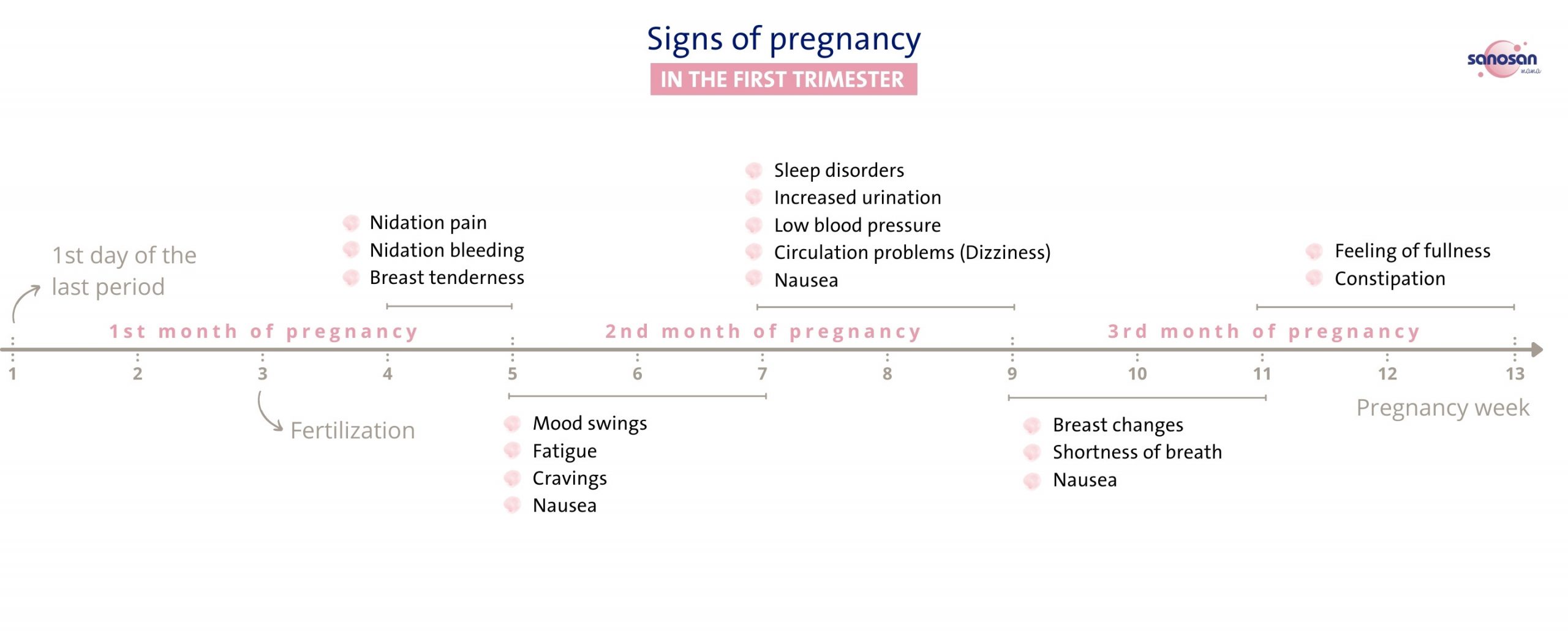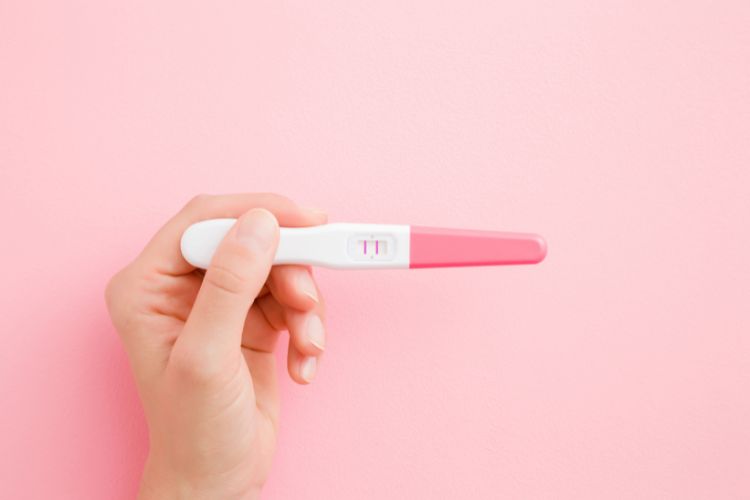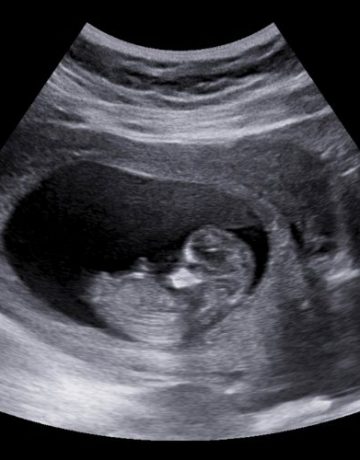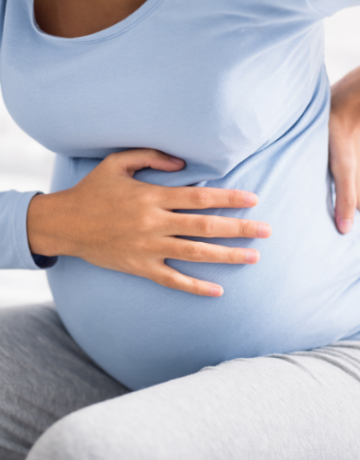Pregnancy symptoms and the first month of pregnancy
Besides the absence of your period or the typical morning sickness, there are a number of other signs that may indicate that you are pregnant. These include, for example, sensitive and tense breasts, fatigue, dizziness or an increased urge to urinate. Whether and to what extent pregnant women experience symptoms in early pregnancy varies greatly. Some notice that they are pregnant some time after fertilization, others only after they have a positive pregnancy test in their hands.
At what point can a pregnancy be detected?
When a fertilized egg implants in the lining of the uterus, the body produces the pregnancy hormone hCG (human chorionic gonadotropin). Already about six to nine days after fertilization of the egg, this hormone can be detected in a blood test at the gynecologist. About two weeks after fertilization, the hCG level in the urine also increases, so that a pregnancy test from the drugstore or pharmacy can be used. Since the hCG level can still be below the detection limit two weeks after fertilization, it makes sense to always use the morning urine (this is when the hCG concentration is highest). If the test is positive, it is very likely that you are pregnant. You should definitely have this confirmed by your gynecologist. Six weeks after the first day of your last period, the pregnancy can also be detected during an ultrasound examination.
What week of pregnancy am I in?

Fertile days are in the middle of a cycle (cycle length: 25-35 days) and usually last for six days. Conception can occur during this short period. Since the time of conception is difficult to determine, the weeks of pregnancy are calculated from the first day of the last period. For example, you are already in the 4th week of pregnancy, although only one week has passed since fertilization.
When do the first signs of pregnancy appear?
About ten days after fertilization, when the body starts to produce hCG, the first symptoms of pregnancy may appear. So you can feel signs of pregnancy even before your period stops. Here we distinguish between uncertain and probable signs. The uncertain signs of pregnancy are considered uncertain because they can easily be confused with the symptoms that women have in the second half of the cycle due to hormonal fluctuations (e.g. sensitive breasts, ravenous appetite). Symptoms such as fatigue, bloating and dizziness can occur quite independently of pregnancy and menstruation and can indicate illnesses, intolerances, nutrient deficiencies, etc.
Uncertain pregnancy signs include:
- Fatigue
- Nausea & change in sense of smell/taste
- Cravings
- Dizziness
- Sensitive breasts
- Bloating & constipation
- Increased urination & bladder weakness
- Increased discharge
- Abdominal pain & light bleeding
Pregnancy signs that are fairly certain to indicate pregnancy are called likely pregnancy signs.
Likely pregnancy signs include:
- Absence of the period
- Increased basal body temperature

Pregnancy signs in detail
Fatigue
A pregnancy sign that can start even before the period stops and last until the end of the 3rd month of pregnancy is fatigue and exhaustion. The reason for this is the increased production of the hormone progesterone, which ensures the implantation of the egg in the uterine lining and ensures a stable pregnancy. At the same time, progesterone has a very calming, almost sedating effect on the pregnant woman’s body. Extreme tiredness and an unusually strong need for sleep can therefore be a very early sign of pregnancy.
Nausea & change in sense of smell/taste
Probably one of the most well-known signs of pregnancy, which affects about 80% of pregnant women, is nausea. It usually occurs between the 5th and 12th week of pregnancy and ranges from a discomfort in the stomach to regular vomiting. The reason for this is the hormonal changes in the pregnant woman’s body, especially the changes and increase in the hormone hCG. Pregnancy nausea can occur not only in the morning, but throughout the day and can be triggered by a variety of factors. For example, the smells, tastes or the mere idea of certain dishes and foods (including, for example, fish, eggs or coffee). A strong aversion to cigarette smoke or intensely scented perfumes is also quite typical (this phenomenon could be a natural protective function of the body, as certain substances are harmful to the baby). It helps against nausea to nibble something dry (e.g. nuts, rusks, bread) directly after waking up and to eat small meals more frequently throughout the day.
Cravings
Another very well-known sign of pregnancy are the classic food cravings. Pregnant women not only have an excessive appetite, but also cravings for rather unusual food combinations, such as pickles with ice cream or Nutella. Why these cravings occur has not yet been scientifically proven. You think the cravings are because the pregnant woman has to eat “for two”? You’re wrong, because this statement is a myth (if you’re interested in pregnancy myths, click here!). However, it could be that the cravings are caused by an increased nutritional requirement or are due to the hormonal changes of the pregnant woman. In fact, during pregnancy, there is an increased production of the hormone insulin, which regulates blood sugar metabolism. As with preventing nausea, regular eating of many small meals also helps with cravings.
Dizziness
In the first months of pregnancy, the expectant mother’s body has to produce more red blood cells to ensure an adequate supply of oxygen for mom and baby. To adjust to the higher blood volume, blood pressure usually drops. This is why long periods of standing or sitting can lead to dizziness and circulatory attacks. To counteract this, alternating showers, sufficient sport and exercise, and brush massages are helpful.
Sensitive breasts
Early pregnancy signs also include sensitive, tense, pulling, swollen or enlarged breasts. Nipples usually also become larger and darker in color. In addition, some women experience varying degrees of sensitivity to touch/pain. You can find tips on how to reduce the feeling of tension and possible pain in the breasts here.
Bloating & constipation
Because a pregnant woman’s body produces a lot of progesterone, she may experience digestive problems such as bloating and constipation. This is because progesterone causes the smooth muscles (muscles that we cannot consciously tense) to relax. Thus, bowel movement slows down and food lingers longer in the intestines. Although the slowed digestion ensures that the food can be digested better, it also ensures that a lot of water is extracted from it and it starts to ferment. This can then lead to constipation and flatulence. As the pregnancy progresses, the uterus puts more pressure on the digestive organs. Digestive problems are therefore not uncommon throughout pregnancy.
Increased urination & bladder weakness
Due to the increase in blood volume and the associated greater blood flow, the kidneys have more to do and thus produce larger amounts of urine. This in turn results in a more frequent urge to urinate. The hormone progesterone relaxes not only the intestinal muscles but also the bladder sphincter. If the pelvic floor is strained (e.g. when sneezing or laughing), the pregnant woman unconsciously loses a little urine. In advanced pregnancy, the growing uterus puts pressure on the pelvic floor and bladder. This promotes both frequent urination and bladder weakness. With targeted pelvic floor training, pregnant women can not only treat these complaints well, but also prevent them.
The hormone progesterone not only relaxes the smooth muscles, but also dilates the urinary tract. Urinary tract infections, such as cystitis, can thus develop more easily. So if symptoms typical of a urinary tract infection occur, such as burning when urinating or pain, a doctor should definitely be contacted.
Increased discharge
Due to the hormone-induced increased blood flow, not only the kidney produces more urine, but also the vagina more moisture. This is usually manifested by increased discharge. If this is creamy-white, odorless and thin, there is no reason to worry. However, if the smell and color change in combination with symptoms such as burning and itching, a doctor should definitely be consulted. Bacterial infections or other diseases must be treated immediately so that the baby is not endangered.
Abdominal pain & light bleeding
In the 4th week of pregnancy, i.e. about a week after fertilization, implantation bleeding may occur. This is a light faint bleeding accompanied by a slight pulling sensation in the abdomen. These symptoms can also be easily mistaken for the onset of a period.
Absence of the period
One of the surest signs of pregnancy is the absence of a period. However, the monthly period can also be very much delayed or completely absent for other reasons. This is the case, for example, with psychological stress, underweight or severe weight loss, illnesses and hormonal disturbances (such as after discontinuation of the pill). One hundred percent certainty is therefore also with this pregnancy sign only a pregnancy test.
Increased basal body temperature
The basal body temperature is also called the waking temperature, because it is the body temperature that you have in the morning after waking up before getting up. With the help of the basal body temperature, the fertile days can be determined if measured regularly. At ovulation, the basal body temperature rises slightly, then remains elevated for a few days and drops again shortly before menstruation. If the basal body temperature does not drop after ovulation, but remains elevated for more than 18 days, you are probably pregnant.







Comments (0)